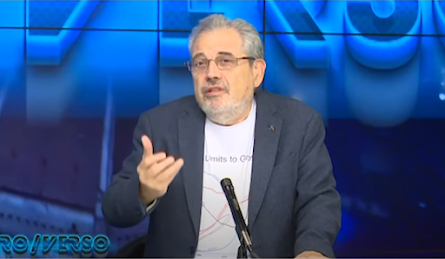A few days ago, I was invited to an interview on a local TV about the energy transition. I prepared myself by collecting data. I was planning to bring to the attention of viewers a few recent studies that showed how urgent and necessary it is to move away from conventional engines, including a recent paper by Roberto Cazzolla-Gatti(*) that shows how the combustion of fossil fuels is one of the main causes of tumors in Italy.
And then I had a minor epiphany in my mind.
I saw myself from the other side of the camera, appearing on the screen in someone's living room. I saw myself as one more of those white-haired professors who tell viewers, "look, there is a grave danger ahead. You must do as I say, or disaster will ensue."
No way.
I could see myself appearing to people as more or less the same as one of the many TV virologists who had terrorized people with the Covid story during the past three years. "There is a grave danger caused by a mysterious virus. If you don't do as I say, disaster will ensue."
It scared people a lot, but only for a while. And now the poor performance of TV virologists, Tony Fauci and the others, cast a shade over the general validity of science. As a result, we now see a wave of anti-science sweeping the discussion while carrying along the flotsam of decades of legends. Fake lunar landings, earthquakes as weapons, how Greenland was green at the time of Erik the Red, and don't you know that climate has always been changing? Besides, Greta Thumberg is a bitch.
But it is not so much a fault of the TV virologists, although they have done their part in creating the damage. It is the human decisional system that works in a perverse way. More or less, it works like this:
- Scientists identify a grave problem and try to warn people about it.
- The scientists are first demonized, then ignored.
- Nothing is done about the problem.
- When it is discovered that the warning was correct, it is too late.
Do you remember the story of the boy who cried "wolf"? Yes, it works exactly like that in the real world. One of the first modern cases in real history was that of "The Limits to Growth" in 1972.
- A group of scientists sponsored by the Club of Rome discovered that unrestrained growth of the global economic system would lead to its collapse.
- The scientists and the Club of Rome were demonized, then ignored.
- Nothing was done about the problem.
- Now that we are discovering that the scientists were right, collapse is already starting.
- Scientists tried to alert people about the dangers of climate change.
- Scientists were demonized and then ignored.
- Nothing was done about climate change.
- When it was discovered that the warning was correct, it was too late. (it is).


